|
|
|
Sort Order |
|
|
|
Items / Page
|
|
|
|
|
|
|
| Srl | Item |
| 1 |
ID:
124855


|
|
|
|
|
| Publication |
2013.
|
| Summary/Abstract |
This article develops a mathematical modeling framework using fault trees and Poisson processes for analyzing the risks of inadvertent nuclear war from U.S. or Russian misinterpretation of false alarms in early warning systems, and for assessing the potential value of options to reduce the risks of inadvertent nuclear war. The model also uses publicly available information on early warning systems, near-miss incidents, and other factors to estimate probabilities of a U.S.-Russia crisis, the rates of false alarms, and the probabilities that leaders will launch missiles in response to a false alarm. The article discusses results, uncertainties, limitations, and policy implications.
|
|
|
|
|
|
|
|
|
|
|
|
|
|
|
|
| 2 |
ID:
072895
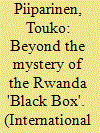

|
|
|
|
|
| Publication |
2006.
|
| Summary/Abstract |
According to the conventional wisdom of the current debate on peacekeeping, the failures of the UN Security Council in general and in Rwanda in particular can be attributed to an absence, not of early warning systems, but of political will on the part of member states. This article argues against the assertion, advanced in much of the existing literature, that political will outweighed early warning in importance. These two factors were interlinked and cannot therefore be compared as if they existed separately. Instead, a more advanced early warning mechanism would have changed the political context so as to facilitate political will to intervene. At a minimal level, such a positive causal relationship would have enabled non-permanent Council members to acknowledge the genocide prior to UNAMIR's (United Nations Assistance Mission for Rwanda) withdrawal and thus to create a political atmosphere of urgency to rescue Rwandans instead of withdrawing troops.
|
|
|
|
|
|
|
|
|
|
|
|
|
|
|
|
| 3 |
ID:
120221
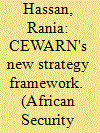

|
|
|
|
|
| Publication |
2013.
|
| Summary/Abstract |
A decade after establishing the Conflict Early Warning and Response Mechanism (CEWARN) of the Intergovernmental Authority on Development (IGAD), the member states endorsed the new strategy framework that is to guide the work of CEWARN until 2019. Although the original legal foundation upon which CEWARN was founded did not specify the types of conflicts that it could be involved in, CEWARN chose to limit itself to cross-border pastoral conflicts. This was partially due to the low levels of confidence between the member states, which prevented CEWARN from engaging in other types of conflicts that are considered to be more 'political' and thus more 'sensitive'. The hope was that after asserting its own success in dealing with cross-border pastoral conflicts, CEWARN would be able to expand its geographical as well as thematic scope. Thus, the most pronounced aspect of the new strategy framework is the expansion of CEWARN operations beyond their current limited focus. Although it is too early to assess the new strategy framework, I attempt to provide a reading of the future of this strategy plan, with particular reference to Sudan and South Sudan. I argue that despite the rhetoric that accompanied the endorsement of the new strategy, the prospects of the new plan in Sudan and South Sudan depend on a number of factors: first, enhancing the mutual trust between Sudan and South Sudan with regard to exchange of information; second, changing Sudan's perceptions with regard to IGAD; and third, securing the much-needed funding for such an expansion of CEWARN's work.
|
|
|
|
|
|
|
|
|
|
|
|
|
|
|
|
| 4 |
ID:
158111
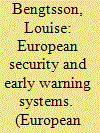

|
|
|
|
|
| Summary/Abstract |
This article critically examines a poorly understood aspect of the European security landscape: early warning systems (EWSs). EWSs are socio-technical systems designed to detect, analyse, and disseminate knowledge on potential security issues in a wide variety of sectors. We first present an empirical overview of more than 80 EWS in the European Union. We then draw on debates in Critical Security Studies to help us make sense of the role of such systems, tapping into conceptual debates on the construction of security issues as either “threat” or “risk” related. Finally, we study one EWS – the Early Warning and Response System for infectious diseases – to understand how it works and how it reconciles risk – versus threat-based security logics. Contrary to assumptions of a clear distinction between risk- and threat-based logics of security, we show that EWSs may serve as a “transmission belt” for the movement of issues from risk into threats.
|
|
|
|
|
|
|
|
|
|
|
|
|
|
|
|
| 5 |
ID:
120050
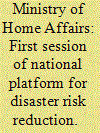

|
|
|
|
|
| Publication |
New Delhi, Ministry of Home Affairs, 2013.
|
| Description |
356p.pbk
|
|
|
|
|
|
|
|
|
|
|
|
Copies: C:1/I:0,R:0,Q:0
Circulation
| Accession# | Call# | Current Location | Status | Policy | Location |
| 057211 | 363.340954/MIN 057211 | Main | On Shelf | General | |
|
|
|
|
| 6 |
ID:
079919
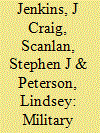

|
|
|
|
|
| Publication |
2007.
|
| Summary/Abstract |
Discussions of world hunger have focused on economic growth and international food aid, assuming that food supply is the critical issue. The authors show that food access rooted in social stratification and military power is the central problem. Synthesizing the entitlement and military famine approaches to hunger, the authors examine the effects of food supply, economic growth, social stratification, and military power on child hunger in less developed countries (1990-2000) using a cross-national analysis. Child hunger is largely due to gender stratification, militarization, and armed conflict. Halting wars, expanding political rights, and improving gender equity reduce child hunger. Economic growth and programmatic international food aid reduce child hunger, but there are no benefits from increased total food supply or international emergency relief. Child hunger is an access problem best addressed by expanding social and political rights, reducing armed conflict and militarization, and improving women's status. Early warning and relief efforts should focus on these concerns instead of the ``supply'' concerns traditionally emphasized
|
|
|
|
|
|
|
|
|
|
|
|
|
|
|
|
| 7 |
ID:
103534


|
|
|
|
|
| Publication |
2011.
|
| Summary/Abstract |
The Financial Crisis in the late 1990s and the ongoing crisis have showed the importance of creating an early warning system (EWS) to lessen economic, political, and foreign policy fallout. Surprisingly, the EWS literature rarely considers the role of political institutions to detect economic dangers that can be harbingers of conflict. Controlling for common explanations in the literature, we use panel data for fifty developing countries from 1987 to 2004 to investigate the effect of political determinants for predicting economic crises. Although most political variables appear to have little influence in forecasting defaults or currency crises, models specified with bond ratings from the credit rating agencies can be helpful for predicting the onset of crisis. Our research is a first step toward gaining insights into how best to anticipate crisis that may prove beneficial particularly in light of the current global crisis.
|
|
|
|
|
|
|
|
|
|
|
|
|
|
|
|
| 8 |
ID:
114220


|
|
|
|
|
| Publication |
2012.
|
| Summary/Abstract |
Networks are often heralded as a promising strategy of global governance. This article examines the challenges encountered in managing one relatively successful network-the Global Outbreak Alert and Response Network (GOARN). Over the past decade, this international network of public and private institutions has played a major role in organizing the global response to infectious disease outbreaks around the world. Despite its successes, GOARN confronts difficult challenges in balancing performance objectives with the goals of maintaining and developing the network. The imperative to integrate closely into World Health Organization (WHO) operations makes it difficult for GOARN to balance its obligations to the WHO with the need to maintain and cultivate its role as an independent network.
|
|
|
|
|
|
|
|
|
|
|
|
|
|
|
|
| 9 |
ID:
120222
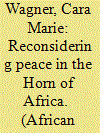

|
|
|
|
|
| Publication |
2013.
|
| Summary/Abstract |
After only ten years in existence, the African Union (AU) has already made its mark on the landscape of peace and security in Africa. This paper seeks to explore the relationship between the AU's leading collaborative interstate security policy, the African Peace and Security Architecture (APSA), and sustainable peace in the Horn of Africa. It examines four countries - Djibouti, Eritrea, Ethiopia, and Kenya - and how engaging with the APSA through early warning systems can contribute to developing the elements necessary for sustainable peace, namely regional stability, conflict management, and good governance.
|
|
|
|
|
|
|
|
|
|
|
|
|
|
|
|
|
|
|
|
|